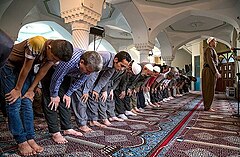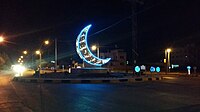| Jumu'atul-Wida | |
|---|---|
 Jameh Mosque of Sanandaj Jumu'ah during Ramadan Jameh Mosque of Sanandaj Jumu'ah during Ramadan | |
| Official name | Jumu'atul-Wida |
| Observed by | Muslims |
| Begins | Last Friday of Ramadan |
| Date | last Friday in the month of Ramadan before Eid-ul-Fitr |
| Frequency | annual |
| Part of a series on |
| Islam |
|---|
 |
| Beliefs |
| Practices |
| History |
| Culture and society |
| Related topics |
Jumu'atul-Wida (Arabic: جمعة الوداع meaning Friday of farewell, also called al-Jumu'ah al-Yateemah Arabic: الجمعة اليتيمة or the orphaned Friday Urdu: الوداع جمعہ Al-Widaa Juma) is the last Friday in the month of Ramadan before Eid al-Fitr. This is a holy day for Muslims.
Muslims ask for Allah's forgiveness and they give to the poor on this day. They offer prayers and they believe that prayers made on this day will be answered. Muslims believe giving to the poor (zakat) on Ramadan will bring them wealth and blessings during the year and in the future. The Jumu'atul-Wida is a chance for Muslims to say goodbye to Ramadan as Eid al-Fitr approaches.
Background
Jumu'atul-Wida is the last Friday prayer or Jumu’ah; Wida means end referring to the end of Ramadan. Another name for the holiday is Alvida Jumma meaning Friday of farewell.
The name of the day means a farewell to Ramadan. In Islam, Friday is the Sabbath and the holiest day of the week; consequently the last Friday of Ramadan is important because it gives Muslims a chance to reflect on Ramadan. Jumu'atul-Wida is considered one of the five holiest days for Muslims and is the holiest sabbath in Islam.
History
In observation of the day, Muslims attend Friday Jumu’ah prayers and they go to a mosque to pray. Worshippers also ask for forgiveness from Allah. The Jumu'atul-Wida is important because it is the last Friday Jumu’ah in the holy month of Ramadan and the hadith teaches that heaven is opened and hell is closed during Ramadan. The term is not found in the Qur'an or Hadith. Worshippers observe the day by washing their body and wearing new clothing. During the day they recite passages from the holy Quran. Another feature of the day is that Muslims in cities tend to pray together in one large mosque.
Muslims believe that prayers made on this the last Friday of Ramadan will be answered. Muslims also believe giving to the poor (zakat) on this day will bring them wealth and blessings in the year and in the future. They also believe that all of their sins will be forgiven by praying and reciting the Holy Quran on this day. Jumu'atul-Wida does not have a dedicated prayer or "Ibadah".
Followers of Islam believe that Allah's prophet prayed throughout Ramadan's last ten days. When he woke in the night he also prayed. The day reminds Muslims of their chance to live a good life. The day also reminds Muslims that Ramadan is coming to an end.
At the conclusion of Ramadan there is a feast called Eid al-Fitr and Muslims traditionally offer the greeting Eid Mubarak. The word Eid means feast or festival. The meaning of Eid Mubarak is blessed celebration.
See also
References
- ^ "Holy Jumu'atul Wida today". Daily Bangladesh. 7 May 2021. Retrieved 29 March 2024.
- ^ "Alvida Jumma Mubarak! Eid al-Fitr wishes, messages and mehndi designs". www.timesnownews.com. Bennett Coleman & Company Limited. 22 May 2020. Retrieved 29 March 2024.
- ^ al-Din, Khwajah Kamal (1918). The Islamic Review. Ann Arbor, Michigan: University of Michigan. p. 253. Retrieved 30 March 2024.
- Slivinski, Krystina (22 December 2000). "Celebrations Planned to Mark End of ramadan". Chicago Tribune. p. 213. Retrieved 30 March 2024.
- Haavie, Erikah (13 November 2004). "Wappingers Recognizes Muslim Holy Day". Poughkeepsie Journal. pp. 1B. Retrieved 30 March 2024.
- "Fast of Ramadan". Arizona Daily Star. 7 March 1888. p. 1. Retrieved 30 March 2024.
- Mahtab, Muhammad; Mazed, Hossain (May 2021). "Significance of the last Friday of Ramadan". Daily Sun. Retrieved 3 April 2024.
- "Alvida Jumma Mubarak 2022: Wishes and significance". India Today. Retrieved 30 March 2024.
- "Jumu'atul-Wida 2023: Know its significance for Muslims and how they celebrate It". CNBCTV18. TV18 Broadcast Limited. 20 April 2023. Retrieved 30 March 2024.
- ^ "Jum'atul-Wida: Last Leg of an Opportunity". Kashmir Observer. Kashmir Observer. 7 May 2021. Retrieved 29 March 2024.
- "Why are there two Eids and what is the difference between Eid al-Fitr and Eid al-Adha?". BBC Newsround. BBC. 28 June 2023. Retrieved 29 March 2024.
| Ramadan | ||
|---|---|---|
| Background |  | |
| Meals | ||
| Prayers and observances | ||
| Ramadan culture | ||